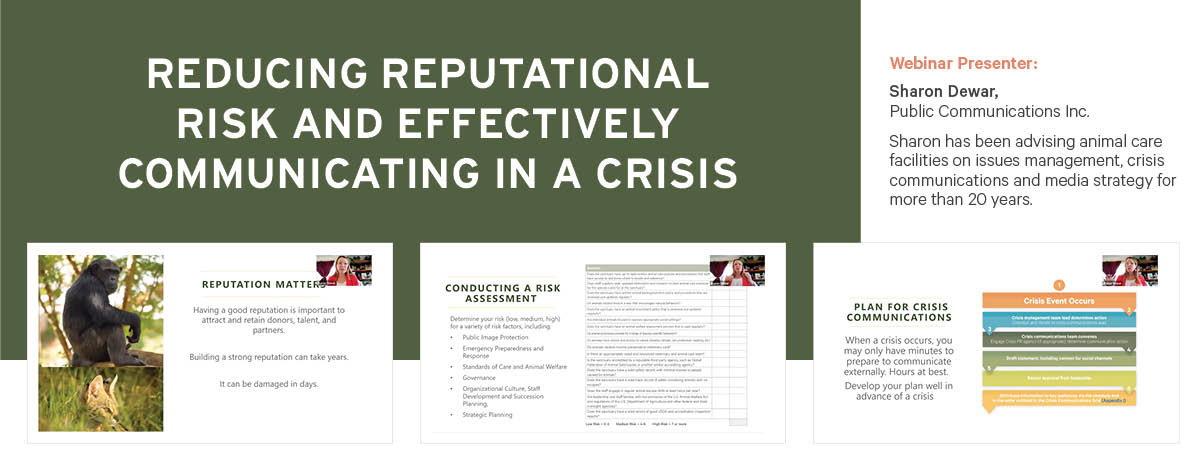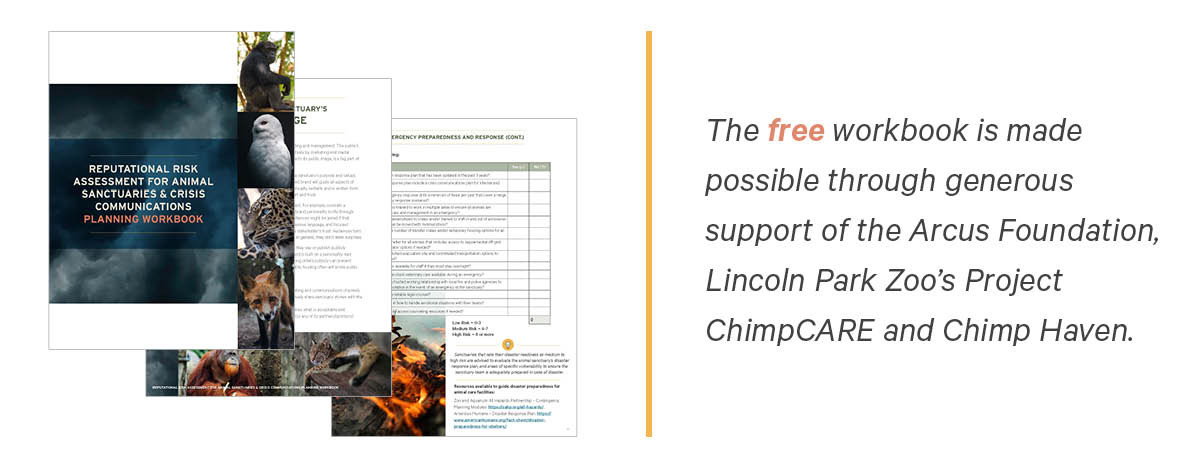
Don’t Handle Crisis…Avoid It! Reputational Risk Management’s the Key
Free New Risk Management Tool is Available to Help Animal Sanctuaries
Think about a brand you love. Why do you love it? Many factors may shape your opinion, but chances are good that these two apply:
You trust it.
It has a good reputation.
An unblemished reputation attracts consumers, donors, talent, and partners. Many organizations invest significantly in brand building and marketing activities to increase their brand equity. And many invest mightily, from a traditional marketing perspective, in protecting their brand standards and public image. Yet surprisingly few have a dedicated, structured reputational risk management program.
That’s a surprising miss and can be a fatal flaw. Too often organizations only consider damage to their reputation when they are actively managing a threat. But that isn’t risk management, that’s crisis management.
Our phones ring frequently for that kind of support, and we are always happy to help clients who are navigating a crisis. But a recurring theme always emerges – so many of these crises could have been avoided if reputational risk management had been a strategic priority for the organization.

The reality is that few crises are like tornadoes – surprising, unpredictable, and destructive. Most crises are more akin to a slowly rising tide that is ignored and dismissed until the waters threaten to drown the organization. Only then do leaders consider the reputational risk they face, but at that point the damage can rarely be avoided, only minimized.
But what if you could foresee the crisis well before it happened and change the trajectory? Think of reputational risk management as your magic crystal ball. When you use it effectively, you can anticipate likely future events and take active measures to change the course. You can avoid crises.
The more an organization invests in reputational risk management, the less it needs to invest in crisis management, and the brand equity continues to grow without compromise. Seems simple, right? So why don’t more companies prioritize reputational risk management?
The simple answer is that risk is notoriously difficult to quantify.
We make it easier.
We’ve worked with dozens of animal care institutions over the past several decades and have managed all manner of crises. While every situation has its own unique flavor and contributing factors, certain commonalities and trends are clear. We’ve honed and compiled that knowledge into a new Reputational Risk Assessment & Crisis Communications Planning Workbook for Animal Sanctuaries, made possible and freely accessible thanks to generous funding by the Arcus Foundation, in partnership with Lincoln Park Zoo’s Project ChimpCARE and Chimp Haven.
This new assessment tool, which is free to any animal sanctuary, harnesses decades of insights and experience specifically tailored to the risks sanctuaries face. There is nothing else like it available.
It provides animal sanctuary leaders with a step-by-step process for conducting a reputational risk assessment at their facility. The workbook includes an analysis of their risk, ranked as low, medium, or high across several categories. Should an elevated risk be identified, each category includes references for free and accessible resources to lower the risk level.
It can’t be overemphasized – when you identify an elevated reputational risk, you have the power to change the course of history. You can minimize it and protect your brand and reputation, or you can ignore it and potentially drown later. Don’t take that risk.
We’re proud to have developed this assessment tool so animal sanctuaries can succeed in rescuing animals in need, a cause PCI’s Conservation team supports every day. Watch our webinar to learn more about reputational risk assessment and crisis communications planning for sanctuaries. We walk you through the assessment tool and its customizable crisis communications plan.




